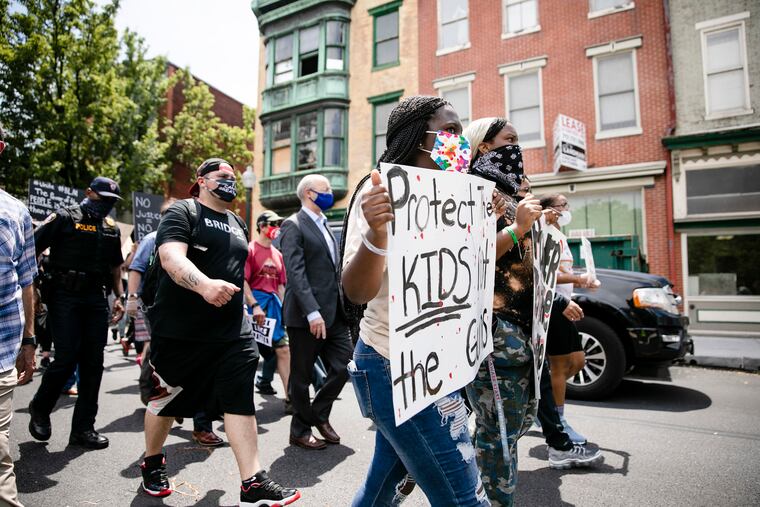Pa. legislators’ attempt at ‘police reform’ still prioritizes blue lives over Black ones | Opinion
Pennsylvanians must hold legislators accountable for crafting bills that, in fact, leave Black lives just as vulnerable and devalued as they were before.

Pennsylvania legislators have failed constituents who voiced dissent on policing last month by introducing four weak police reform bills. Our state House and Senate each pushed through two bills that promise “police reform” and are currently being reviewed for passage.
Pennsylvanians must hold our elected officials accountable for crafting bills that leave Black lives just as vulnerable and devalued as they were before that legislation was introduced.
Here are six ways the legislators are maintaining the status quo for Black and blue lives while pretending to do something constructive.
1. Chokeholds are still allowed. Some lawmakers intended to outlaw chokeholds and positional asphyxia, but SB 1205 didn’t quite get there. The bill defines chokehold as “[a] physical maneuver that restricts an individual’s ability to breathe for the purposes of incapacitation” (emphasis mine), and permits chokeholds when “deadly force is authorized.”
So: My ability to breathe can be restricted if an officer doesn’t choke me to incapacitate me, or an officer is authorized to use deadly force. The bill doesn’t care when I can’t breathe, and since neither cops nor citizens seem to know when deadly force is authorized, I — and others like me — remain subject to chokeholds.
2. Escalation is blessed. De-escalation is all but damned. SB 1205 also suggests, but doesn’t require, that a law enforcement officer “first attempt using types and degrees of force that reasonably appear to be inadequate to accomplish intended objectives.” The bill also does not mandate the use of de-escalation or harm reduction techniques. It states an officer can “consider” de-escalation as he deems it “reasonably prudent” to apply. Officers and the public are left to decipher whether the person setting the standard is the reasonable prudent officer or a reasonable prudent person.
3. Use-of-force policies are not mandated. According to SB 1205, the goal of the bill is to “direct agencies in developing use-of-force policies and outline the content of these policies,” and not “to mandate the actions of individual law enforcement officers.”
That means agencies need not worry about asking their employees to actually follow the policies. Agencies just have to Google a form policy and certify that such policies exist. Our legislators found no reason to incentivize departments that do follow those policies or penalize those that do not.
Under such a system, being civilians of color remains a risky business — anything in our possession can be defined as a weapon, and our mere presence can still be interpreted as an “immediate threat.”
4. Use-of-force reports are required — but agencies can feel free to create something palatable. Per SB 459, the Pennsylvania State Police commissioner will meet with chiefs of police and the Fraternal Order of Police to determine what gets reported relating to use of force. The commissioner is tasked with coming up with the “most efficient and least burdensome procedures.”
This prioritization of efficiency and a low burden, over civilian safety, is dangerous and undermines officer accountability.
5. Not all law enforcement officers get implicit bias training. In-service training, including for implicit bias, is required of police officers, but not officers in charge. This conveniently differs from HB 1910′s use of the phrase “law enforcement officer” in other parts of the bill, which appears to include all officers.
6. Employers are not held accountable for police misconduct. HB 1841 grossly misses the mark on making employment information about officers available to Pennsylvania law enforcement agencies. Employment information is not given if a previous agreement prohibits disclosure. The bill does not mention how long background records are to be kept, nor include a deadline for when a law enforcement agency must provide the background investigation information requested by a prospective employer. It also requires no certification that employment information provided is complete or true. Law enforcement agencies face no penalty for failing to disclose employment information. And hiring agencies can disregard any of the bills’ enumerated issues relating to use of force as long as they give a rationale for hiring an officer.
We must demand our legislators draft bills that ban chokeholds, require law enforcement agencies to document police complaints, and make police misconduct public. Today is the time to petition our leaders, to protest their pretense, before these bills become settled law.
Samantha Jallah is a Pennsylvania lawyer and writer.